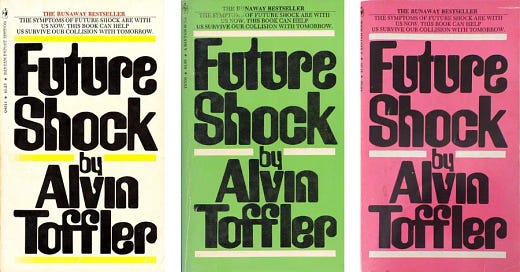The year was 1970 and Alvin Toffler's book "Future Shock" burst onto the scene. As the writer and music historian, Ted Gioia describes, the book was everywhere, selling upward of six million copies. “It was a disturbing forecast, and everybody paid attention.”
Toffler showed up on the couch next to Johnny Carson on The Tonight Show. Other talk show hosts (Dick Cavett, Mike Douglas, etc.) invited him to their couches too. CBS featured Toffler alongside Arthur C. Clarke and Buckminster Fuller as trusted guides to the future. Playboy magazine gave him a thousand dollar award just for being so smart.
When he died in 2016, at age 87, obituaries praised Alvin Toffler as “the most influential futurist of the 20th century.”1
What Toffler was saying was:
“The acceleration of change in our time is, itself, an elemental force.”
And in 1970, indeed, the dizzying pace of change seemed to embody Toffler’s warnings. The year felt like the beginning of a breathless, accelerating, albeit slightly disjointed run-on sentence. . .
In the world of AI, a new forum for groundbreaking ideas emerged as the Artificial Intelligence journal published its first issue promising to showcase original papers on all aspects of AI from novel methods to new ways of looking at AI problems even as the field teetered on the edge of a winter few could foresee in the wake of Minsky and Papert's critique of perceptrons the year before, and across the country the ARPANET stretched its digital tendrils linking east and west through its first host-to-host protocol in a precursor to the internet that would one day connect billions2 and at MIT a young programmer named Terry Winograd was teaching a computer named SHRDLU to understand natural language manipulating blocks in a simple world that hinted at a future where man and machine might converse as easily as old friends3 and Edgar F. Codd was publishing his groundbreaking paper on relational databases laying the foundation for how we would organize and access the vast amounts of information the digital age would soon produce4 and in the realm of space exploration Apollo 13 reminded us of both the promise and peril of reaching for the stars its near-disaster a testament to human ingenuity and the fragility of our ventures beyond Earth's atmosphere5 and not to be outdone the Soviets soft-landed Venera 7 on the hellish surface of Venus transmitting data from another planet for the first time in human history6 and speaking of firsts Luna 17 delivered Lunokhod 1 to the moon the first remote-controlled robot to explore another celestial body a mechanical emissary extending human reach across the void7 and back on Earth scientists achieved another milestone synthesizing a live cell for the first time blurring the lines between the organic and the artificial8 and as if in response to these rapid advances the first Earth Day was celebrated a global recognition of our planet's fragility in the face of technological progress9 and in the halls of power the Non-Proliferation Treaty came into force a desperate attempt to put the nuclear genie back in the bottle10 even as the war in Vietnam spilled over into Cambodia and on college campuses the tension finally snapped as National Guardsmen opened fire at Kent State a tragedy that would echo through the decades11 and just days later at Jackson State in Mississippi police unleashed a barrage of gunfire on a group of African American students killing two and wounding twelve others in a stark reminder of the ongoing struggle for civil rights and racial justice12 and in Chile Salvador Allende became the first democratically elected Marxist leader in Latin America shifting the balance of the Cold War13 and in the world of culture The Beatles officially called it quits marking the end of an era even as new voices rose to fill the silence and the Boeing 747 took to the skies shrinking the world even further and symbolizing how far we'd come since Kitty Hawk and how far we might yet go as humanity stood on the brink of a new decade filled with promise and peril in equal measure the future rushing towards us at breakneck speed leaving us breathless and wondering what marvels and monsters the next year might bring.
‘Two’ from Today
Thinking Like an AI - In Ethan Mollick’s 100th post on Substack he considers: “how I could summarize the many things I have written about how to use AI. I came to the conclusion that the advice in my book is still the advice I would give: just use AI to do stuff that you do for work or fun, for about 10 hours, and you will figure out a remarkable amount.
However, I do think having a little bit of intuition about the way Large Language Models work can be helpful for understanding how to use it best. I would ask my technical readers for their forgiveness, because I will simplify here, but here are some clues for getting into the “mind” of an AI . . .”
Machines of Loving Grace by Anthropic’s CEO Dario Amodei “dropped a mammoth tome out of nowhere, following Vinod Khosla’s provocation asking if AI is a dystopia or utopia.” via Azeem Azhar






I remember talking about Future Shock a lot at Friends. We all had copies, not sure if it was actually part of the curriculum.